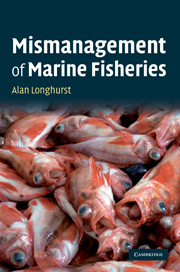Book contents
- Frontmatter
- Contents
- Preface
- 1 From certainty to doubt in fishery science
- 2 The ecological consequences of the exceptional fecundity of teleosts
- 3 Indeterminate growth, negative senescence and longevity
- 4 Marine ecosystems: their structure and simulation
- 5 The natural variability of fish populations and fisheries
- 6 Has sustainability in fishing ever been achieved?
- 7 What is the real state of global fish populations?
- 8 The mechanics of population collapse
- 9 Why don't some fish populations recover after depletion?
- 10 Is the response of the fishery science community appropriate?
- 11 Conclusion: sustainability can be achieved rarely and only under special conditions
- Index
1 - From certainty to doubt in fishery science
Published online by Cambridge University Press: 05 July 2014
- Frontmatter
- Contents
- Preface
- 1 From certainty to doubt in fishery science
- 2 The ecological consequences of the exceptional fecundity of teleosts
- 3 Indeterminate growth, negative senescence and longevity
- 4 Marine ecosystems: their structure and simulation
- 5 The natural variability of fish populations and fisheries
- 6 Has sustainability in fishing ever been achieved?
- 7 What is the real state of global fish populations?
- 8 The mechanics of population collapse
- 9 Why don't some fish populations recover after depletion?
- 10 Is the response of the fishery science community appropriate?
- 11 Conclusion: sustainability can be achieved rarely and only under special conditions
- Index
Summary
‘Less fishing is wasteful, for the surplus of fish dies from natural causes without benefit to mankind.’
W. M. Chapman, 1948Fishery science is usually perceived by its practitioners as being a critical and quantitative activity, deeply dependent on mathematical analysis; indeed, the introduction to a well-known text on fisheries science suggests that only those who are comfortable writing computer programs or playing with numbers should become involved in fisheries management. This blunt statement demonstrates what went wrong with the science: it forgot that it is heavily dependent on two other disciplines – biology and ecology – in which numerical predictions are quite often unsatisfactory. Consequently, there is a fundamental contradiction between the potential capability of fishery science and its stated task of making routine and quantitative predictions concerning the effects of specified levels of fishing on a stock of fish.
Biology is notorious for its lack of predictive theory, and for its high content of inductive and a-priori generalisations that are based on simple observation of nature. As Murray noted, ‘the fact that biology lacks . . . universal laws and predictive theory . . . poses a serious problem for both biologists and philosophers’. Nevertheless, it is possible to deduce simple biological laws and to verify them by the prediction of ecological observables: I shall discuss one such example in Chapter 2. Such laws may be used to falsify theories that have been arrived at by inductive methods.
- Type
- Chapter
- Information
- Mismanagement of Marine Fisheries , pp. 1 - 15Publisher: Cambridge University PressPrint publication year: 2010



